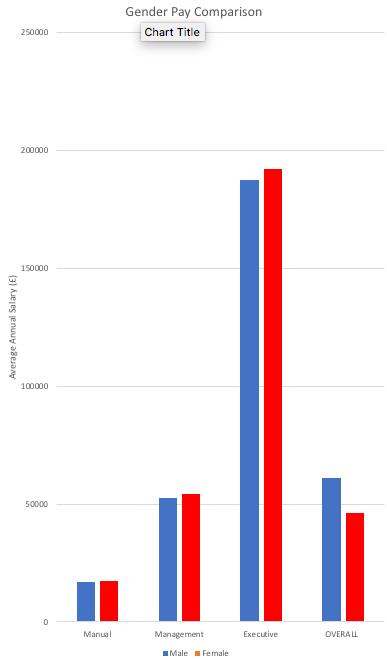On Gender Pay Gaps (Simpson's Paradox)
Let's imagine a smallish (1000 employees) company that employs 3 types of employees - about 800 'workers' with salaries between £10,000 and £25,000. The gender split is roughly 7:1 female to male. The next type is 'management': pay between £40,000 and £70,000, 150 employees, 50:50 gender split. Finally there are the 'fat cat' executives, 50 of them: £120,000 to £250,000 and a gender split of 1:4 female to male. I really don't know if this is typical but it seems reasonable and will illustrate the point I'm trying to make.
To get some typical figures I set up a Python program to (nearly) randomly assign pay to these employees. (not quite random because I've fixed it a bit to give equivalent female employees of each type a slightly higher average pay than her male equivalent. Program and spreadsheet with figures are available to download by clicking the button at the end of this post.
So, what does this produce? Well, something that at first glance seems surprising (but, as it happens, is a well known paradox if you look for it:
| Employee Type | Female: average pay | Male: Average pay |
| Worker | £ 17,319 | £ 16,970 |
| Management | £ 54,420 | £ 52,580 |
| Executive | £192,000 | £187,500 |
| OVERALL AVERAGE | £43,665 | £61,119 |

But, how can this be? In every category females earn more than males but OVERALL, males earn much more, on average, than females!
The reason, of course, is that there are far more females in the lower paid categories. EasyJet made this point strongly when releasing their gender pay-gap figures. Pilots earn high pay - and most pilots are men. Cabin crew don't earn nearly as much - and most of these are women.
This is quite an interesting statistical 'quirk' but I feel it is very important. We should not be asking why there is a gender pay gap (implying that the company pays men more than women for doing exactly the same job), we should be asking why are so many more women employed in lower payed roles?
The first question is pretty superficial and probably easily fixed by enforcing existing legislation.
The second is much more fundamental and needs much more clarity.
- Do companies, consciously or unconsciously, expect to employ men in higher paid roles?
- Do women prefer lower paid roles?
- Does society expect women favoured roles to be lower paid?
- Are women only capable of lower paid roles?
- Are all men bullies who keep women out of higher paid roles?
- Does child-rearing essentially force women into lower paid roles?
I'm sure there are lots of other 'reasons' we could think of. BUT UNTIL WE ACTUALLY START TO DO SOME UNBIASED SEROUS SCIENTIFIC STUDY - we probably don't even know the right question - let alone the best answer.
